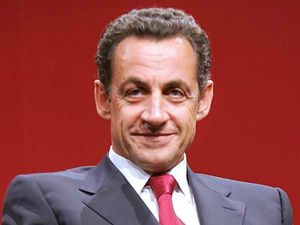Nicolas Sarkozy
Nicolas Sarkozy
Nicolas Sarkozy was born the 28th of January 1955. He is the 23rd and current President of the French Republic. He assumed the office on 16 May 2007 after defeating the Socialist Party candidate Ségolène Royal 10 days earlier. Before his presidency, he was leader of the Union for a Popular Movement (UMP)
Nicolas Sarkozy has proved a divisive figure in office and the economic crisis has eroded his support.
He has outraged rights activists with his immigration policies and upset traditionalists with his private life. On 15 February he launched his campaign for re-election, but faces a battle to beat socialist candidate François Hollande, who has currently a clear lead in opinion polls. He also faces a strong conservative challenger, Marine le Pen of the National Front.
Nicolas Sarkozy described himself as “the captain of a boat in the heart of a storm”.
He has the support of Germany’s Chancellor Angela Merkel, with whom he found an agreement on EU budget policy in response to the eurozone debt crisis.
He developed unpopular policies. He pushed through pension reforms in 2010 despite mass protests and strikes. He raised the retirement age from 60 to 62 while unemployment remained high.
But the biggest obstacle he may face at the election is the state of the French economy. In fact, in January Standard & Poor’s downgraded its credit rating from AAA to AA.
The media seems to be more interested in his private life than the issues facing the country.
For the BBC, Nicolas Sarkozy may become the first president not to be re-elected for a second term since Valery Giscard d’Estaing.
It’s true that he is a man of enormous resource, self-confidence, a tremendous campaigner but even with these talents, the task to win the elections is monumental.
His pitch during the elections had been to tell the voters that, though they might dislike him, he struggled against the economic crisis. But after the downgrade, this argument seemed to be a little thin.




/https%3A%2F%2Fassets.over-blog.com%2Ft%2Fcedistic%2Fcamera.png)
/https%3A%2F%2Fencrypted-tbn3.google.com%2Fimages%3Fq%3Dtbn%3AANd9GcRlsUnqbhhaVX4OFcvTLrsxBTfifmXioNTcCw-Rr17GhEXuWKCv)
/https%3A%2F%2Fstorage.canalblog.com%2F08%2F76%2F969274%2F75379790_o.jpg)